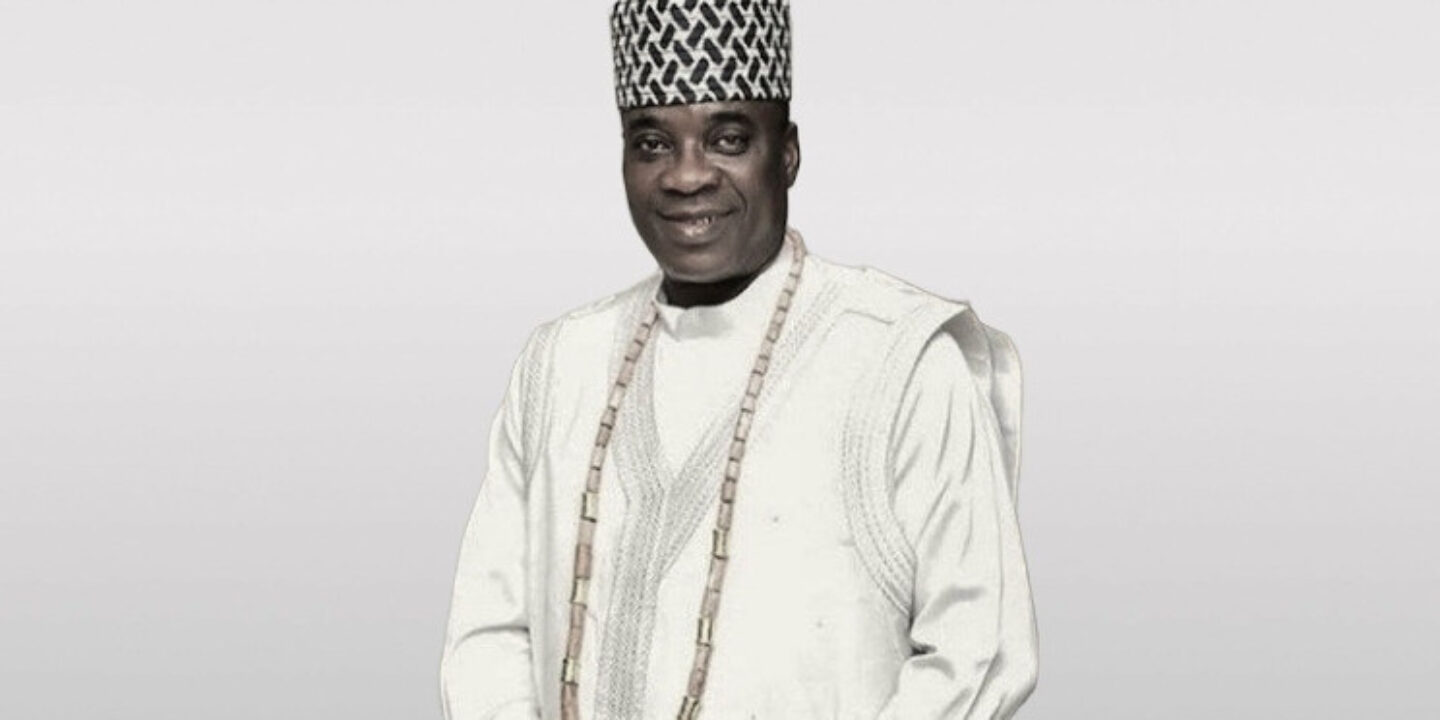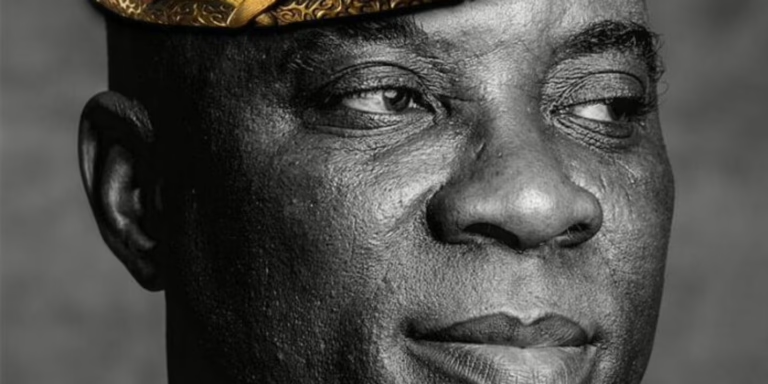Within the vibrant realm of Afrobeats, where infectious rhythms energize dance floors globally and Nigerian artists reign supreme on international charts, a subtle yet powerful connection links every chart-topping track to a singular pioneer. This connection often traces back to one iconic figure: King Wasiu Ayinde Marshal, globally revered as K1 De Ultimate. Crowned the King of Fuji, he is widely regarded, alongside other legends, as a foundational architect shaping the very essence of contemporary Nigerian music.
The Birth of a Musical Movement
Our journey begins in 1957, in the lively district of Agarawu, Lagos State, where Wasiu Omogbolahan Olasunkanmi Adewale Ayinde Marshal entered the world. Raised amidst the rich tapestry of Yoruba oral traditions, young Wasiu was surrounded by the rhythmic dialogues of talking drums, the melodic narratives of griots, and the spiritual chants that enlivened communal ceremonies.
It was during the 1970s, under the mentorship of Ayinde Barrister-the visionary founder of Fuji music-that Wasiu’s path became clear. As a member of the Supreme Fuji Commanders, he mastered both the technical craft of music and the profound duty of cultural stewardship. Fuji, a genre born from blending traditional Yoruba percussion with Islamic influences, transcended mere entertainment; it embodied identity, history, and spiritual expression through rhythm.
By 1980, with the launch of his debut album Iba, Wasiu began carving his unique path. However, it was the release of Talazo ’84 that heralded a transformative force in music. This album was not just another Fuji record; it was a declaration of artistic progression. K1 De Ultimate revitalized the grassroots genre, infusing it with electrifying energy and innovation, giving rise to what became known as Talazo Fuji.

The Sonic Innovator
During the 1980s, K1 De Ultimate performed a remarkable feat of musical transformation. Traditional Fuji, rooted in street performances and religious festivities, was predominantly acoustic and community-centered. K1 De Ultimate envisioned Fuji as a universal language, capable of resonating with a broader audience while preserving its cultural integrity.
His approach was both deliberate and inspired. Electric guitars began to harmonize with talking drums, saxophones layered melodies over Yoruba chants, and keyboards provided harmonic depth to age-old percussion patterns. This was not cultural dilution but evolution. K1 De Ultimate recognized that for Fuji to endure and flourish, it needed to expand without sacrificing its essence.
The effect was immediate and far-reaching. Fuji concerts transformed into theatrical spectacles, with K1 De Ultimate’s commanding presence and his band’s electrifying performances attracting diverse audiences beyond traditional ethnic and social lines. Urban youth, who might have overlooked traditional music, found themselves drawn to this modern yet respectful reinterpretation of their cultural roots.
A Living Musical Archive
K1 De Ultimate’s prolific output is staggering. With over 200 studio and live albums, he has built an extensive archive that chronicles not only his artistic evolution but also the shifting landscape of Nigerian society. His music serves as a historical record, capturing political events, social movements, and cultural transformations with the precision of a historian and the soul of a poet.
Each album narrates tales of love, loss, victory, and hardship, weaving tradition and change. His lyrics, predominantly in Yoruba, vividly depict Nigerian life, while his melodies evoke emotions that transcend language barriers. This universality explains why his music resonates across cultures, allowing international listeners to feel its power even without understanding every word.
The zenith of his archival achievement occurred on December 9, 2024, when K1 De Ultimate accomplished an unprecedented feat: releasing 100 live albums in a single day. This was no mere publicity stunt or collection of rehearsals; each album was a fully realized artistic expression. Through this, K1 De Ultimate proclaimed that Fuji-and by extension Yoruba culture-is an inexhaustible, living tradition capable of endless reinvention.
The Blueprint of Afrobeats
To grasp K1 De Ultimate’s impact on modern Nigerian music, it’s essential to understand that Afrobeats did not arise spontaneously. This globally dominant genre carries within it the genetic imprint of its predecessors: Afrobeat, Highlife, Juju, Apala, and notably, Fuji. K1 De Ultimate’s modernization of Fuji during the 1980s and 1990s laid the groundwork that Afrobeats artists would later build upon.
The engaging call-and-response patterns in Afrobeats echo the interactive dynamics of K1 De Ultimate’s live shows. The percussion-driven beats that fuel Afrobeats’ infectious energy trace back to the Fuji rhythms he popularized. The seamless fusion of traditional and contemporary elements that defines Nigerian pop today was pioneered by K1 De Ultimate decades ago.
When artists like Burna Boy claim the title “African Giant,” or when Wizkid and Davido celebrate their roots, they are treading paths forged by K1 De Ultimate. His influence transcends music; it is philosophical. He proved that Nigerian musicians could honor their heritage while conquering global stages, that tradition need not be antiquated, and that local culture can achieve universal appeal.
The Most Sampled Legend in Nigerian Music
In today’s digital era, influence is often measured by how frequently an artist’s work is sampled, reinterpreted, or reimagined. By this standard, K1 De Ultimate stands as one of Nigeria’s most sampled and influential musicians. His extensive catalog is a goldmine for Afrobeats producers and artists eager to connect with their cultural roots while crafting contemporary hits.
When Olamide opens “Anifowose” with elements from K1 De Ultimate’s “Omo Anifowose,” he bridges generations, introducing younger listeners to Fuji’s rich heritage while infusing it with modern flair. Similarly, Davido’s sampling of “Agogo Ko Ma Ro” in “Like Dat” underscores K1 De Ultimate’s enduring cross-generational appeal. Despite having access to global sounds, Davido’s choice to draw from K1 De Ultimate’s work highlights Fuji’s lasting relevance.
Wizkid’s incorporation of “K1 De Ultimate For Wizkid Vol. 2 (Live)” into “Troubled Mind” pays homage to K1 De Ultimate as both an influence and a creative collaborator across time. Asake’s use of “Won Tun Nna” in “C’mon Look” exemplifies the latest wave of this cultural recycling. Asake’s neo-Fuji style within Afrobeats is a direct descendant of K1 De Ultimate’s innovations, proving the King’s legacy continues to inspire fresh artistic expressions. Additionally, K1 De Ultimate’s “Awa Tunde Batinde” features in Reminisce’s “The Ultimate” (featuring Vector), and “Funky Fuji” appears in Bhadboi OML’s “Wasiu Ayinde.”
More Than Samples: Shaping Cultural Frameworks
K1 De Ultimate’s impact extends beyond sampling into the very fabric of how contemporary Nigerian artists craft their music. His expertise in engaging audiences, embedding social commentary within danceable tunes, and balancing tradition with innovation serves as a blueprint throughout the Afrobeats industry.
Artists like Burna Boy, who weave social consciousness into their music and use their platforms to address political and cultural issues, echo K1 De Ultimate’s longstanding practice of embedding societal critique within his songs. His music has tackled themes from political corruption to social inequality, always wrapped in melodies that make the message accessible.
The theatricality of modern Afrobeats performances-with elaborate staging and interactive audience participation-also reflects K1 De Ultimate’s influence. He transformed Fuji concerts from straightforward musical events into communal celebrations where the line between performer and audience blurred. This immersive experience now defines Afrobeats shows worldwide, from intimate venues to massive festivals.
The Sync Phenomenon
K1 De Ultimate’s reach extends into film and television, where his music has been featured in Nollywood productions, breathing new life into his compositions. Tracks like “Consolidation” and “Nigeria the New Era Pt. 2” appear in Everybody Loves Jenifa, while “Show Color,” “Won Tun Nna,” and “Gang of Lagos” feature in Red Circle. These placements introduce his music to audiences who might not actively seek out Fuji, broadening his influence through the powerful medium of cinema.
This crossover success underscores one of K1 De Ultimate’s greatest accomplishments: crafting music deeply rooted in Yoruba culture yet universally appealing. His songs function equally well as evocative soundtracks for dramatic scenes and as captivating live performances, demonstrating their versatility and timelessness.
A Pillar of Cultural Heritage
K1 De Ultimate’s importance transcends music, establishing him as a cultural institution. His numerous chieftaincy titles-including Mayegun of Yorubaland, Olori Omo Oba Akile Ijebu, Balogun of Ilupeju Ekiti, Badabarawu of Ogijo, and Ekerin Amuludun of Ibadanland-honor not only his musical achievements but also his role as a guardian of Yoruba traditions. These accolades recognize his commitment to preserving and evolving Yoruba culture.
His mentorship of emerging artists, both within Fuji and across genres, has created a ripple effect throughout Nigerian music. Many artists, even those not directly linked to Fuji, carry forward lessons from K1 De Ultimate’s approach to creativity, performance, and cultural responsibility. This subtle yet profound influence may be his most enduring legacy, shaping how Nigerian musicians perceive their roles as cultural ambassadors.
Global Impact and Reach
K1 De Ultimate has brought Fuji music to international stages across Europe, North America, and Asia, introducing global audiences to the intricate rhythms and rich heritage of Yoruba music. These performances have dismantled cultural barriers, proving that authenticity and artistry can transcend language and cultural differences.
His influence on the worldwide African music scene extends beyond his own concerts. As Afrobeats gains global prominence, the Fuji elements embedded within it-largely stemming from K1 De Ultimate’s innovations-expose international listeners to traditional Nigerian music forms. Each time an Afrobeats track with Fuji influences plays on global platforms, K1 De Ultimate’s cultural imprint travels with it.
A Living Link Between Eras
K1 De Ultimate’s true distinction lies in his role as a living bridge connecting Nigeria’s musical heritage with its future. He has honored traditional forms while pioneering new directions, maintained cultural authenticity while embracing global trends, and respected his predecessors while nurturing the next generation.
His journey exemplifies evolution without abandonment, innovation without disrespect, and growth without loss of identity. In a world where globalization often threatens local cultures, K1 De Ultimate demonstrates that the solution lies not in resistance but in thoughtful adaptation-embracing the best of tradition to create fresh expressions.
An Enduring Legacy
Examining today’s Nigerian music scene, K1 De Ultimate’s influence is unmistakable. He is sampled not merely because his music is sonically appealing, but because his work embodies the essence of Nigerian identity-something younger artists instinctively seek to connect with.
His rhythms pulse with Nigeria’s heartbeat. His melodies resonate with Yoruba soul. His innovations chart a path forward while his traditions anchor the present to the past. By sampling K1 De Ultimate, Afrobeats artists tap into a cultural reservoir that links them to their heritage and identity.
A Legacy Beyond Measure
As K1 De Ultimate continues to tour, record, and inspire, his legacy is firmly established. He transformed a traditional genre into a global language, created a vast catalog serving as both cultural archive and creative wellspring, and influenced generations of artists who carry his innovations onward.
Ezekiel Olayinka, General Manager of Digital Music Commerce And Exchange Limited and custodian of K1 De Ultimate’s catalog, reflects on this legacy:
“We see ourselves not just as catalog managers but as guardians of a national treasure. Our mission is to preserve and amplify the monumental legacy within his 200-plus albums, ensuring this cultural archive reaches new generations in the digital era. Recognizing his foundational influence on the Afrobeats genre celebrated worldwide, we forged a landmark partnership with Sony Music Publishing Nigeria. K1 De Ultimate’s catalog is not just history; it’s a living, dynamic source of commercial and creative value, continually sampled by today’s biggest stars. Collaborating with K1 De Ultimate is a masterclass in artistic evolution and cultural preservation. He is a living bridge between generations, the architect of modern Nigerian music’s sonic and philosophical foundation, and our goal is to ensure his eternal influence resonates globally.”
While statistics-over 200 albums, numerous awards, international acclaim, and record-breaking achievements like releasing 100 albums in one day-tell part of the story, the true measure of his impact lies in today’s music. It lives in the voices of artists inspired by his example and in the samples that keep his work vibrant for new audiences.
From Olamide’s street anthems to Davido’s chart-toppers, from Asake’s neo-Fuji explorations to emerging talents, K1 De Ultimate’s influence flows like a mighty river through Nigerian music. He is the undisputed King of Fuji, the sovereign of legacy, the architect of continuity, the bridge between past and future.
Ultimately, K1 De Ultimate’s greatest triumph may be this: as Nigerian music conquers the world, it never forgets its origins. Every Afrobeats hit sampling his work, every artist acknowledging his influence, every young musician balancing tradition with innovation, they all contribute to K1 De Ultimate’s ongoing narrative.
The King of Fuji has transcended his title to become an indelible part of Nigerian music’s DNA-an eternal force whose voice will echo through generations to come. When the world moves to Afrobeats, it moves to his rhythm. When Nigeria’s musical heirs sing tomorrow’s songs, they sing with his spirit.
K1 De Ultimate: The visionary who ensured Nigeria’s musical future would always honor its past, and that its past would forever inspire its future.




















0 Comments